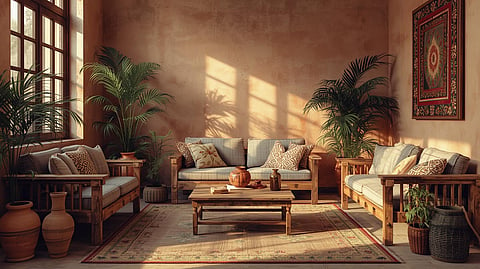

In a fast-paced world dominated by mass production and consumerism, the Japanese philosophy of Wabi-Sabi offers a refreshing perspective rooted in simplicity, imperfection, and natural beauty. Wabi-Sabi celebrates the imperfect, transient, and incomplete, encouraging us to find elegance in the aged, the weathered, and the handmade. For Indian households seeking a sustainable lifestyle, incorporating Wabi-Sabi principles into home decor not only nurtures mindfulness but also reduces environmental impact.
Understanding Wabi-Sabi
Wabi-Sabi combines two concepts: 'Wabi' refers to rustic simplicity and understated elegance, while 'Sabi' means the beauty that comes with age and use. Together, they embody an appreciation for the natural cycle of growth and decay, making it a perfect philosophy for sustainable living.
Applying Wabi-Sabi in Sustainable Indian Home Decor
Indian homes are traditionally rich in handmade crafts and natural materials, aligning naturally with Wabi-Sabi aesthetics. Here’s how you can embrace this philosophy practically:
1. Celebrate Handcrafted and Natural Materials
Opt for decor items made from natural fibers like cotton, jute, or khadi. For example, handwoven cotton curtains or khadi cushion covers not only bring texture and warmth but also support artisanal communities.
2. Embrace Imperfect Pottery and Ceramics
Instead of flawless mass-produced crockery, use imperfect, hand-thrown earthenware or terracotta pots. These items, often found in local Indian markets, age beautifully and add character to your kitchen or living spaces.
3. Repair and Repurpose Furniture
Rather than discarding old wooden furniture, consider repairing or refinishing it to highlight natural grain and wear marks. A well-loved sheesham wood chair with visible knots and scratches tells a story and reduces the demand for new timber.
4. Use Vintage and Upcycled Decor
Incorporate vintage Indian textiles like kantha quilts or block-printed fabrics for throws and upholstery. Upcycled materials reduce waste and bring unique charm to your interiors.
5. Simplify and Declutter
Wabi-Sabi encourages living with less and appreciating what you have. Maintain a minimalist approach by keeping spaces open, organized, and filled only with items that offer personal meaning or utility.
Practical Use-Case: Integrating Wabi-Sabi in a Living Room
Imagine a living room with a mix of locally crafted jute rugs, an old teak wood coffee table with visible wear, and terracotta planters holding indoor plants like money plants or snake plants. The walls feature hand-embroidered wall hangings from Rajasthan, and cushions are covered with khadi fabric. This setup not only feels warm and inviting but also promotes sustainability by using durable, natural, and locally sourced materials.
Benefits of Wabi-Sabi for Sustainability
- Reduces Waste: By valuing repairs and imperfections, fewer items end up in landfills.
- Supports Local Artisans: Choosing handmade Indian crafts empowers rural communities.
- Encourages Mindfulness: Focusing on quality over quantity fosters intentional consumption.
- Cuts Carbon Footprint: Using natural and durable materials reduces reliance on synthetic, energy-intensive products.
Conclusion
The Wabi-Sabi philosophy offers Indian homes a meaningful way to embrace sustainability through decor. By valuing imperfection and the natural aging of objects, we reconnect with cultural craftsmanship and reduce environmental harm. Simple choices like selecting handwoven cotton throws, repairing wooden furniture, or incorporating rustic pottery can transform any space into a mindful haven that honors both tradition and the planet.
At marvelof.com, we spotlight the latest trends and products to keep you informed and inspired. Our coverage is editorial, not an endorsement to purchase. If you choose to shop through links in this article, whether on Amazon, Flipkart, or Myntra, marvelof.com may earn a small commission at no extra cost to you.
